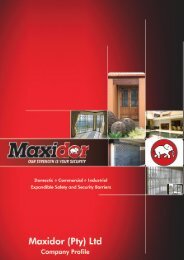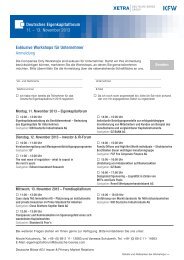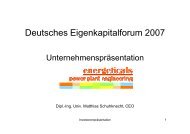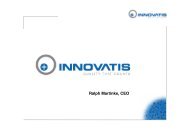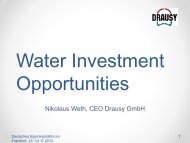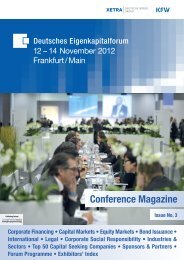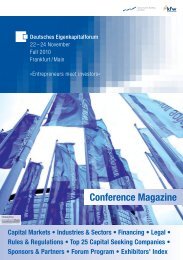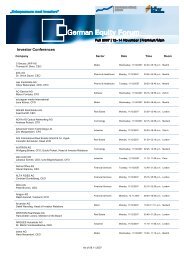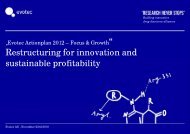Conference Magazine - Deutsches Eigenkapitalforum
Conference Magazine - Deutsches Eigenkapitalforum
Conference Magazine - Deutsches Eigenkapitalforum
You also want an ePaper? Increase the reach of your titles
YUMPU automatically turns print PDFs into web optimized ePapers that Google loves.
Legal<br />
“Other challenges already exist alongside accounting,<br />
capital investment and corruption cases”<br />
Interview with Dr. Stefan Heißner, Partner at Ernst & Young GmbH<br />
Wirtschaftsprüfungsgesellschaft, about financial crimes such as<br />
fraud and compliance risks and how to deal with them in practice.<br />
<strong>Conference</strong> <strong>Magazine</strong>: Dr. Heißner, could it be said that<br />
during a crisis companies are closest to themselves and,<br />
therefore, fraud cases increase, also because they are then<br />
usually more tolerated?<br />
Heißner: The links cannot be presented in such sweeping<br />
terms. To begin with, during a crisis employees in a company,<br />
who for example are responsible for commercial<br />
success in sales, come under increasing pressure for success<br />
and thus a tendency towards marginal ethics grows.<br />
Even more, this is also related to the fact that these<br />
employees frequently have variable salary components<br />
which depend on sales success. In a survey which Ernst &<br />
Young carried out last year against the backdrop of the<br />
crisis, 25% of the employees surveyed in Germany alone<br />
admitted that they consider bribery payments to support<br />
the company in a crisis as morally justified, by the way in<br />
Russia 45% of the employees surveyed were of this<br />
opinion. Here in parti cular, this is the perspective of employees<br />
working in areas at risk of corruption and at best<br />
that of lower management.<br />
<strong>Conference</strong> <strong>Magazine</strong>: Isn't it interesting that major financial<br />
crime cases almost exclusively come to light in times of<br />
crisis, how do you explain that?<br />
Heißner: Well, at Enron and Madoff for example, the rigging<br />
was discovered as a result of insolvency. All major “fraud”<br />
cases have one thing in common which is that the public<br />
asks why rigging to that extent was not recognized at a<br />
much earlier stage. In my experience, and I have already<br />
been working in this field in different roles for almost 20<br />
years, supervisory institutions, legislators and also companies<br />
have all been looking for answers, have analyzed<br />
famous cases in great detail and introduced measures over<br />
the years to prevent similar cases in future. The key words<br />
here are SOX regulations, the German Corporate Governance<br />
Initiative, the minimum requirements of compliance<br />
management systems in the finance sector and also fraudrelated<br />
auditing standards as well as an auditor's proposal<br />
of auditing standards for compliance management sys -<br />
tems.<br />
Page 26 <strong>Deutsches</strong> <strong>Eigenkapitalforum</strong> Fall 2010<br />
Dr. Stefan Heißner manages the<br />
Fraud Investigation & Dispute Ser<br />
vices Germany Switzerland Austria,<br />
Central & South Eastern Europe, CIS<br />
Division at Ernst & Young.<br />
Dr. Stefan Heißner, Partner,<br />
Ernst & Young GmbH<br />
<strong>Conference</strong> <strong>Magazine</strong>: How do they work?<br />
Heißner: Leading German companies have compliance<br />
management systems in the meantime which serve as a<br />
standard to other companies worldwide. Fundamental<br />
answers to an increasingly complex business life combined<br />
with incentive structures as well as organization and control<br />
weaknesses with fraud and corruption have been specified.<br />
Now it is all about the continuous further development of<br />
fraud and compliance management systems and their<br />
effective and efficient integration into companies' existing<br />
management systems. However, in the process we must<br />
not ignore that other challenges already exist alongside<br />
accounting, capital investment and corruption cases. Here I<br />
would like to explicitly address data protection, cartel cases<br />
and foreign trade regulation violations and blacklists. In my<br />
opinion, more themes will be added in future.<br />
<strong>Conference</strong> <strong>Magazine</strong>: And the Compliance Manager,<br />
who is not officially governed by management: what are<br />
your experiences with such a position?<br />
Heißner: The role of the compliance officer is meanwhile<br />
generally not only seen in companies listed on the capital<br />
market but also in owner-managed SMEs. I believe that



